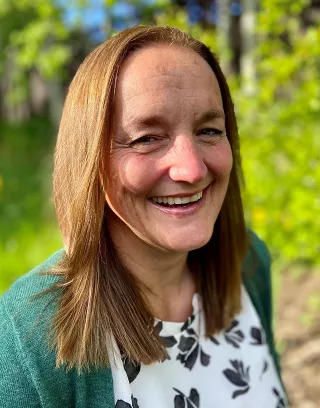
Sanders, Dr. Caroline
MBE; PhD; RN
Biography
Dr. Sanders, MBE, is a Professor in the School of Nursing at UNBC. Having held a clinical academic position in the United Kingdom, Dr. Sanders remains an interdisciplinary scholar focusing on child health, rare conditions, and action-and-participant-orientated engagement. Research focuses on child and family health and well-being. Dr. Sanders applies qualitative and mixed-method approaches, specifically phenomenology, narrative inquiry, and participatory action research, often framed within patient-oriented research. Clinical-academic research methods focus on rare conditions and early childhood, explicitly focusing on developing and translating knowledge across healthcare and community boundaries. Research and international collaborations have focused on the experiences and impact of living with a rare condition, specifically how the medical landscape influences choice and informed decision-making. Caroline has a longstanding partnered research program within the field of variation in sex development with a focus on exploring the meaning and impact of living with a rare condition by uncovering the influences that shape gender, wellness, resilience, and long-term health outcomes.
Caroline’s long-standing research program concerns early childhood development, how knowledge is both created and taken up in practice to improve health in the early years for rural and northern children and their families and communities. Working with interdisciplinary providers, community partners, decision-makers, children, youth, and their families and young adults, scholarship focuses on discovery and applied science. Within a framework of compassionate systems leadership, Caroline is focused on understanding how the implementation and impact of relevant knowledge can be developed and used to evaluate healthcare approaches and interventions in academic and applied clinical contexts, such as decision-making, program engagement and evaluation. An emerging area of scholarship focuses on the nursing workforce in rural settings, specifically internationally-educated nurses, bridge education and employed student nurse positions.
Research and expertise
- Health
- Health and Well-being
- English
Selected publications
Friesen, M., Josewski, V., Sanders, C. (2025) To explore the types of barriers that midwives face when practicing or attempting to practice in rural and remote locations. Journal Advanced Nursing http://doi.org/10.1111/jan.16737
Onororemu, O. E., & Sanders, C. (2024). Are pediatric practicum experiences a beneficial component of registered nurse education programs? Nursing students and new graduates weigh in: A qualitative descriptive research study. Nurse Education Today, 139, 106259. https://doi.org/10.1016/j.nedt.2024.106259
Pelletier, C., Cornish, K., Sanders, C. (2023). ‘There’s not a lot of places for them to go’: rural and remote family perspectives on children’s independent mobility. Children’s Geographies. https://doi.org/10.1080/14733285.2024.2302108
Koopmans, E., Provencher, L., Irving, L., & Sanders, C. (2022). Weaving a new blanket together: Lessons on compassionate leadership and engagement from a virtual regional summit on early childhood wellness in northern communities of British Columbia, Canada. Research Involvement and Engagement. https://researchinvolvement.biomedcentral.com/articles/10.1186/s40900-022-00391-5
Sanders, C., Frank, T., Amyot, T., Cornish, K., Koopmans, E., Usipuik, M., Irving, L., & Pelletier, C. (2022). Day-to-day life during the COVID-19 pandemic: A longitudinal qualitative study with Canadian parents of young children. Contemporary Issues in Early Childhood. https://doi.org/10.1177/14639491221115475
Magritte, E., Williams, J., Amyot, E., Usipuik, M., & Sanders, C. (2022). Listening to individuals “not doing surgery doesn’t mean doing nothing”. Horm Res Paediatr https://www.karger.com/Article/FullText/525452
Usipuik, M., Sanders, C., Amyot, E., Banner, D., & Jones, T. (2022). Menstruation management and medication for people with congenital adrenal hyperplasia. The Canadian Journal of Human sexual development. https://doi.org/10.3138/cjhs.2021-0043
Sanders, C., Amyot, E., Usipuik, M., Crawford, L., Callens, N., Chanoine, JP., & Jones, T. (2022). Lifespan healthcare transitions among individuals with intersex traits in Canada: A mixed methods and qualitative study. BMJ Open, e055759. https://doi.org/10.1136/bmjopen-2021-055759